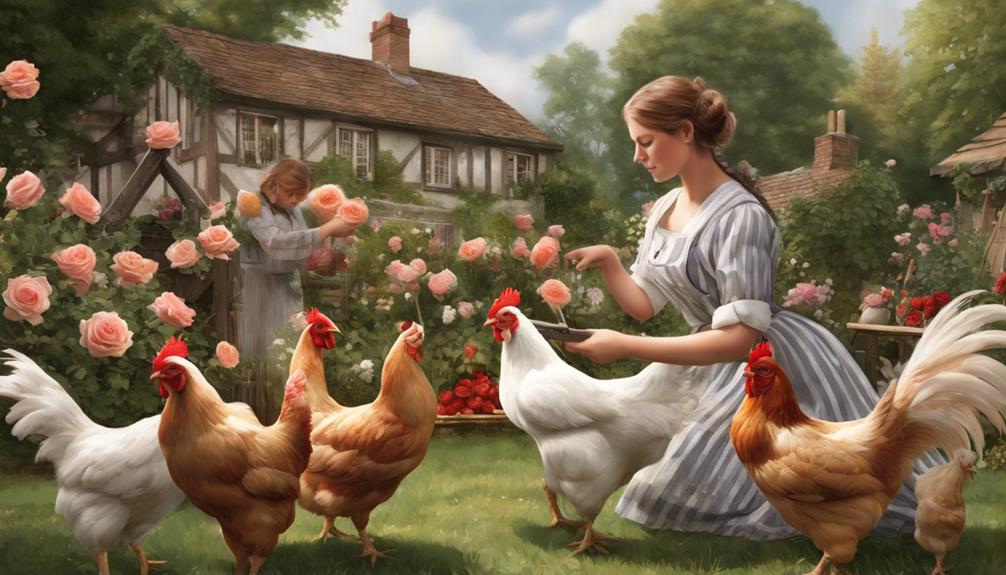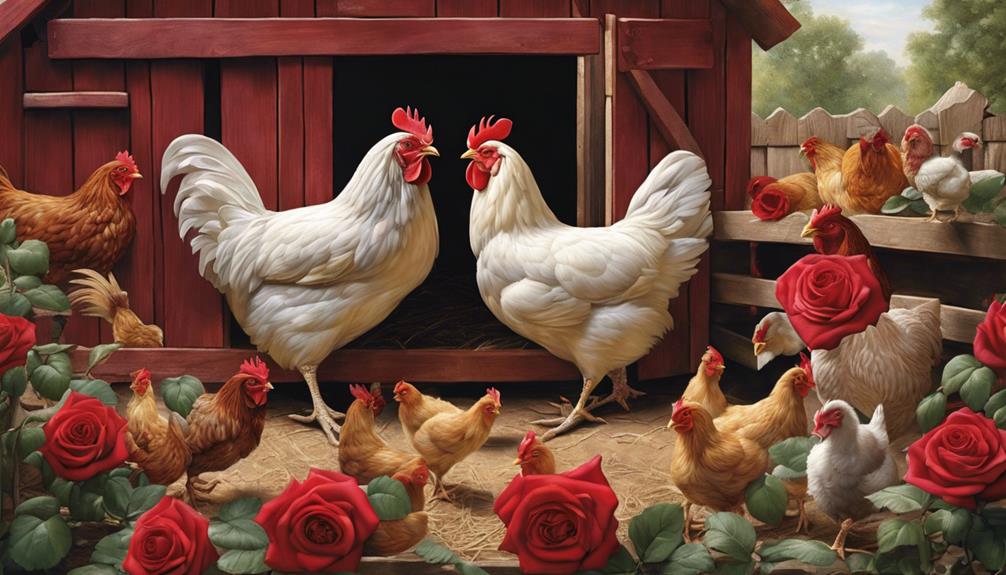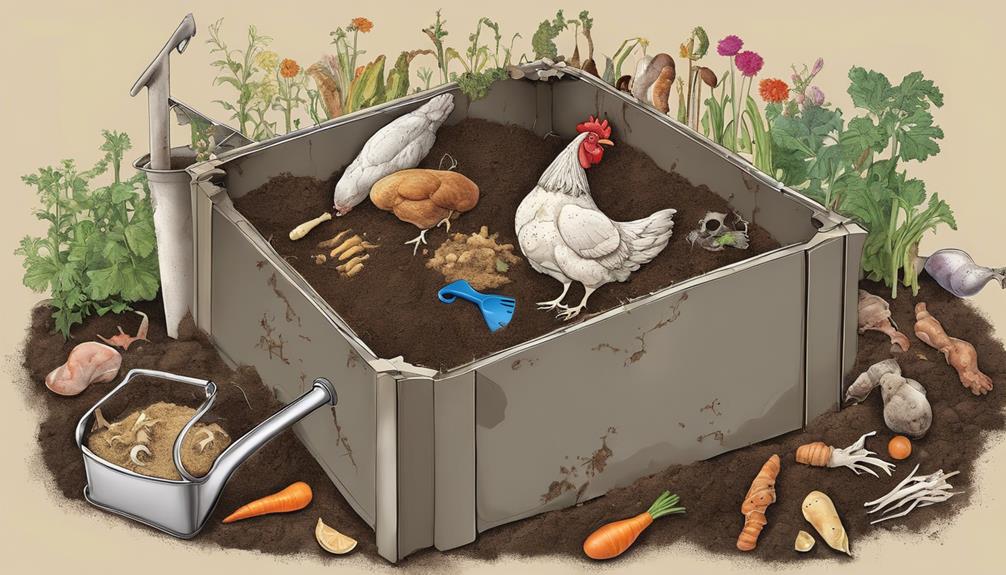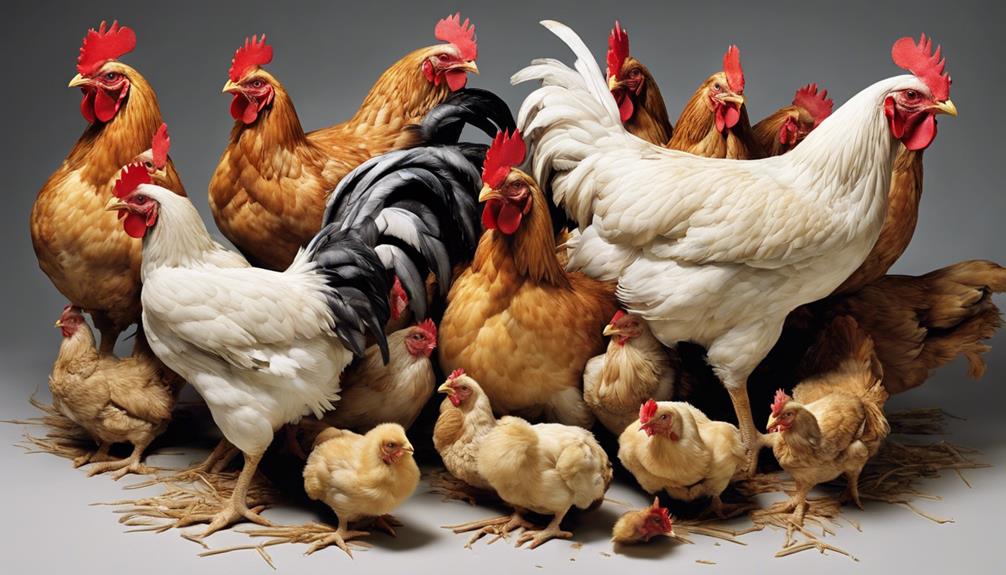When feeding chickens roses, we can improve their health by adding rose hips that are rich in essential vitamins and antioxidants to their diet, potentially boosting food efficiency and reducing cholesterol levels. To safely introduce this special treat, it is important to choose organic roses that are free of pesticides, pick darker and plump rose hips for the best nutrition, and make sure to wash them thoroughly to remove any residues.
By gradually offering fresh rose petals or dried mixes, we can observe their interest and enrich their diet. Remember, ensuring the well-being of our flock is key, starting with safe and gradual introductions of this nutritious treat.
Key Takeaways
- Choose pesticide-free, organic roses to avoid harmful chemicals.
- Gradually introduce roses to prevent digestive issues in chickens.
- Monitor for allergic reactions after feeding chickens roses.
- Ensure safety by prioritizing toxin-free options and careful observation.
- Safely introduce roses for enriched diet and health benefits for chickens.
Benefits of Feeding Chickens Roses
Indisputably, incorporating rose hips into a chicken's diet offers a myriad of health benefits that contribute to their overall well-being and vitality. Chickens eat roses, and the rose hips, in particular, are a powerhouse of nutrients. Rich in essential vitamins like Vitamin C, A, B, E, and K, along with iron and minerals, rose hips act as antioxidants that boost the immune system of chickens. This superfood supports various bodily functions and promotes overall health in our feathered friends.
Not only are rose hips safe for chickens, but they also play a crucial role in reducing oxidative stress, particularly in cold weather. Additionally, feeding chickens rose hips has shown to improve food efficiency and lower cholesterol levels. Harvested rose hips, especially post the first frost, provide a sweet treat full of added nutrients that are especially beneficial for chickens during the winter months. Dried and ground rose hips are readily accepted by chickens and can be conveniently stored for future use. These benefits make rose hips a valuable addition to a chicken's diet, ensuring their well-being and vitality.
Selecting the Right Roses

When selecting the right roses to feed your chickens, prioritize organic varieties free of pesticides and chemicals to ensure their safety and well-being. Opting for darker colored roses can provide more flavor and appeal to your chickens when offering rose petals or rose hips. Look for roses with plump and vibrant rose hips as they offer optimal nutritional benefits for your flock. Avoid wilted or damaged petals, as these may not be as appealing or nutritious for chickens.
Organic roses are essential as they eliminate the risk of harmful chemicals being ingested by your chickens. Darker colored roses tend to be richer in flavor, making them a more attractive option for your feathered friends. Vibrant rose hips are packed with nutrients, making them a valuable addition to your chickens' diet. By selecting the right roses, you can ensure that your chickens receive a safe and delicious treat that contributes positively to their health and well-being.
Preparing Roses for Chickens
After selecting the right roses for your chickens, the next step is to properly prepare them for consumption by removing thorns and stems, washing them thoroughly, and ensuring they're pesticide-free.
- Thorn-Free Delicacies: Eliminate any thorns present on the roses to prevent injury to your chickens' delicate mouths.
- Sparkling Clean: Thoroughly wash the roses to rid them of any dirt or residues that may be harmful to your chickens' health.
- Pesticide-Free Assurance: Always opt for organic roses that are free from pesticides to avoid any potential toxicity to your flock.
When preparing roses for your chickens, it's crucial to prioritize their safety and well-being. By taking the time to carefully remove thorns, wash the petals, and choose organic options, you can ensure that your feathered friends enjoy a delicious and toxin-free treat.
Introducing Roses Into Their Diet

Introducing roses into their diet is a thoughtful way to enhance the nutritional variety and enrichment for your flock of chickens. Rose petals are not only visually appealing but also offer a range of benefits for your chickens. When introducing roses into their diet, it is essential to do so gradually to observe their interest and preferences. Fresh rose petals can be offered as a novel treat to keep your chickens engaged, while dried rose petals can be incorporated into feed mixes to provide added nutrients. Laying hens, in particular, can benefit from the enrichment that rose petals bring to their diet.
| Benefits of Rose Petals for Chickens | |
|---|---|
| Rich in Antioxidants | Source of Enrichment |
| Nutrient-Dense | Varied Chicken Diet |
| Promotes Foraging Behavior | Healthy Treat Option |
| Supports Overall Health | Novel Food Experience |
| Adds Color to Diet | Engages Chickens |
Safety Precautions and Considerations

To ensure the well-being of your flock, it's imperative to prioritize safety precautions and considerations when introducing roses into their diet. When feeding chickens roses, keep these key points in mind:
- Pesticide-Free Roses: Always opt for pesticide-free and organic roses to avoid harmful chemicals that can negatively impact your chickens' health.
- Gradual Introduction: Chickens tend to have sensitive digestive systems, so introduce rose petals gradually to prevent any digestive issues or upset stomachs.
- Monitor for Allergic Reactions: Keep a close eye on your flock after they consume roses for any signs of allergic reactions, such as unusual behavior or physical symptoms.
Frequently Asked Questions
Is It Safe for Chickens to Eat Roses?
Yes, it's safe for chickens to eat roses unless they're treated with harmful chemicals. While roses offer minimal nutritional value, chickens may enjoy consuming them out of curiosity or taste. Rose hips, however, are more beneficial due to their nutrients.
Providing raw roses, including petals and hips, can be a safe and enjoyable treat for chickens. Remember to avoid chemically treated roses to ensure the safety of your flock.
What Is Chickens Favourite Treat?
Chickens have diverse tastes, but some favorite treats include dark leafy greens, watermelon, and grains mixed with essential nutrients. These options not only provide tasty variety but also offer important vitamins and minerals for their health.
High-protein snacks are particularly beneficial during molting periods. By offering a balanced mix of treats, we can ensure our chickens stay happy and healthy while enjoying their favorite snacks.
Are Knockout Roses Safe for Chickens?
Knockout roses are indeed safe for our feathered friends. These blooms are a delightful and pesticide-free option that can add a touch of novelty to our chickens' diet. Their interest in pecking at the petals can be a fun sight to behold.
Are Rose Hips Safe for Chickens?
Rose hips are safe for chickens and offer numerous health benefits. They're rich in essential nutrients like vitamins C, E, and K, as well as minerals like iron.
Varieties such as Rosa rugosa and Rosa canina are particularly beneficial. Rose hips act as antioxidants, boost the immune system, and improve food efficiency, especially in colder weather.
Harvest them after the first frost for sweetness, dry them thoroughly, and store in a cool, dry place for optimal benefits.
Can Chickens Safely Eat Roses if They Can Eat Red Cabbage?
Feeding chickens red cabbage can be a messy affair, but can chickens safely eat roses if they can eat red cabbage? While roses are safe for chickens to eat, they should be offered in moderation. It’s important to remember that a balanced diet is crucial for the overall health of your chickens.
Conclusion
In conclusion, feeding chickens roses can provide them with a nutritious and unique treat. By carefully selecting and preparing the roses, you can safely introduce this food into their diet.
Remember to always monitor their reactions and consult with a veterinarian if necessary. For example, a study showed that chickens who were given roses as a treat displayed increased foraging behavior and overall well-being.
Consider adding roses to your chickens' diet for a happy and healthy flock.










